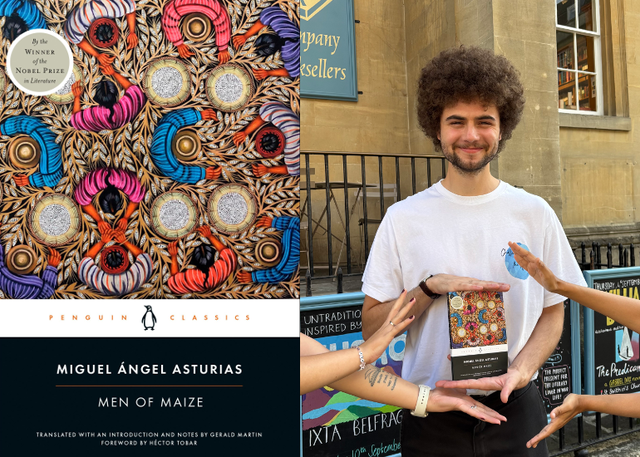World Literature Reading Group
Sunday 12th October
The Library at The Raven, 7 Queen St, Bath BA1 1HE
6.50pm
7pm

The World Literature Reading Group aims to showcase literature written outside of the anglophone world. On our journey we will make a variety of stops in Asia, Africa, the Middle East, the Caribbean, Latin America, and Oceania, tracking down the masterpieces that have otherwise been overlooked. In this fifth group, we will discuss one of the 1967 Nobel Prize Winner for Literature Miguel Ángel Asturias’ greatest novels: Men of Maize.
Deep in the mountain forests of Guatemala, a community of Indigenous Mayans – the 'men of maize' – serves as stewards to sacred corn crops. When profiteering outsiders encroach on their territory and threaten to abuse the fertile land, they enter a bloody struggle to protect their way of life. Blurring the lines between history and mythology, Nobel Prize winner Miguel Ángel Asturias's lush, dream-like work offers a prescient warning against the loss of ancestral wisdom and the environmental destruction set in motion by colonial oppression and capitalist greed.
“Penguin Classics follows its reprint of Asturias’s debut political novel, Mr. President, with the Nobel Prize–winning Guatemalan author’s 1949 masterpiece about the existential struggle between rapacious Westerners and their Ladino collaborators, intent on dominating and exploiting natural resources, and Native peoples who experience and participate in nature as a sacred whole. Asturias was inspired to recast French surrealism through Mayan myth and tradition and set the narrative in Guatemala’s mountain forests, creating a uniquely Indigenous expression that situates his epic at the headwaters of Latin American magical realism, alongside Brazilian writer Mario Andrade’s similarly inspired (though far less somber) Macunaíma. [...] An extraordinary, incomparable work of world literature that requires and rewards multiple readings.” (David Wright, Library Journal)
“Men of Maize describes the birth of a new people. Or, put another way, it describes the journey of an ancient people into a new age. A time when they don Western clothes and marvel at the miraculous interventions of their non‑Western deities in a Spanish‑speaking world. [...] [The novel is] Ángel Asturias’s Mayan masterpiece, his Indigenous Ulysses, a deep dive into the forces that made and kept the Maya a subservient caste, and the perpetual resistance that kept Guatemala’s many Mayan cultures alive and resilient.” (Héctor Tobar, The Paris Review)